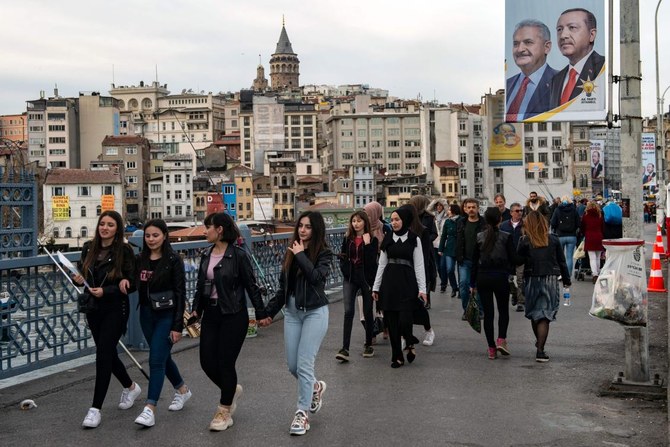ANKARA: President Recep Tayyip Erdogan’s AK Party was heading for defeat in Ankara and the big prize — Istanbul — was a dead heat as vote counting neared its conclusion in Turkey’s local elections on Sunday.
Turkey’s main opposition party chairman said his party’s candidates had won in all three of the country’s biggest cities. Republican People’s Party (CHP) chairman Kemal Kilicdaroglu said CHP candidates had won in Ankara, Istanbul and Izmir along with other cities.
“We have to accept the fact that we have won and lost some cities, this is a necessity in democracies,” Erdogan said in Istanbul, pledging that Turkey would now focus on its troubled economy in the run up to national elections in 2023.
“We have a long period ahead where we will carry out economic reforms without compromising on the rules of the free market economy,” he told reporters.
Ankara has been governed by the AKP and its predecessors for the past 25 years, so these elections brought a paradigm shift in the governance of this symbolic city as the it will now governed by Mansur Yavas, the candidate of a secular-nationalistic opposition coalition. Yavas is known for his conciliatory rhetoric, and past experience in governing another municipality in Ankara.
The driving factor of the elections was a choice between identity-oriented voters and those whose purchasing power has been weakened following the ongoing recession in the country, with Turks suffering 13.5 percent of unemployment and about 20 percent inflation.
There is no scheduled voting in Turkey until 2023. However, many serious crises in the realm of foreign policy and economy are piling up for the country’s decision-makers according to the experts.
Therefore, a challenging period where the AKP may take a more defensive position on various fronts is on the horizon unless a credible and proactive reform program by the economic and political teams is introduced to give confidence to the foreign investors — transforming the elections into a significant electoral test for Erdogan.
But any short-term and more interventionist policies to save the day may further undermine the economic indicators and bring the currency under severe pressure.
There are also widespread rumors about the emergence of possible new political parties in Turkey by Erdogan’s past associates. Such movements, aiming to appeal to centrist-liberal AKP voters, may be further triggered following the local elections as voters are disappointed by increased inflation and unemployment rates.
“For the AKP government, the election turned to a ‘do-or-die’ issue, for the opposition it means a revival and a way to re-democratization,” Seren Selvin Korkmaz, the co-founder and executive director of IstanPol Institute, an independent policy research institute, told Arab News.
For Korkmaz, during the local elections, the unexpected result for many is that polarizing discourse of the government helped the opposition to re-mobilize their voters and re-unite all opposition against the People’s Alliance, and it changed the dynamics of the elections in the last phase.
“In the beginning, supporters of the opposition were unsatisfied with the candidates; they were tired of ‘unsuccessful’ election results and still felt the disappointment of the latest presidential elections. However, in the past two and three weeks, the government’s polarized discourse mobilized all opposition to vote for the most potent opposition candidates,” she said.
While these elections were considered a matter of survival by the government and its nationalistic ally MHP, the opposition camp emphasized the downgrade in the purchasing power of the average voter.
Kurdish votes have influenced the results as the pro-Kurdish People’s Democracy Party (HDP) did not nominate any candidates in the metropolises this time in a bid to support the opposition’s “Nation Alliance” coalition in the West.
“The anti-Kurdish, exclusive rhetoric of the AKP and MHP mobilized Kurds to vote for the strongest candidates of the opposition even if they are unsatisfied with them,” Korkmaz said.
Erdogan escalated his campaign rhetoric by accusing all his opponents of supporting terrorism and by appealing to religious feelings. To manage the effect of the economic crisis, the government also opened in some cities some stores selling food at reduced prices.
The headquarters of the main opposition CHP in Ankara hosted large crowds on election night, with hopeful voters aiming to support their candidate who “won the second prize” in the elections.
“I cast my vote for more freedom of speech and better economic conditions. Young people here barely make it to the end of the month financially and lost all their courage to speak of their problems in public. It changes from the grassroots so I voted for them,” Ayse Baykal, a youngster at CHP headquarters, told Arab News.
For expert Korkmaz, although identity politics is still influential in Turkey — since the citizens feel the economic problems in their everyday life — economic arguments are becoming more visible and might be more influential in the near future in political choices and arguments.
Five elections and one referendum in the past five years resulted in a significant social polarization in Turkey. Two ballot observers from the Islamist-oriented but anti-government Felicity Party were shot dead at a polling station in the eastern province of Malatya by the nephew of a candidate from the AKP.
The Turkish Communist Party (TKP) also won a city in eastern Turkey, Tunceli, for the first time in its history.


















